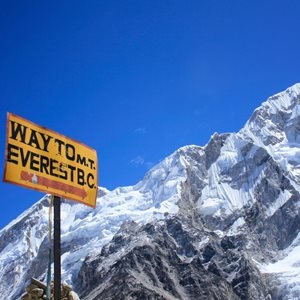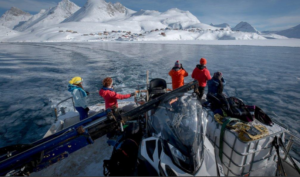Sherpas struggle as Everest shuts down

Kathmandu – An unprecedented shutdown of Mount Everest after the worst ever accident on the world’s highest peak has left grieving Nepalese Sherpa guides and their families fearing for their livelihoods.
The avalanche on April 18 that tore through a group of sherpas — who were hauling gear up the mountain for their foreign clients before dawn — left 16 people dead and three others seriously wounded.
The resulting labour dispute, with sherpas clamouring for better death and injury benefits from the Nepalese government which reaps huge revenues from the multi-million dollar climbing industry, saw scores of expeditions cancelled.
The effective closure of the mountain this season dealt a huge blow to international climbers who paid large sums for the chance to fullfil their dreams of scaling the 8848-metre peak.
But sherpas, who are often the sole breadwinners for their extended families, face a more desperate problem, with many left struggling to make ends meet in a country mired in poverty.
“All of us came here to climb and earn. To choose not to climb is a critical decision for us,” Lam Babu Sherpa told AFP as his expedition prepared to leave Everest base camp. “A cancelled season will be hardest on us.”
As the climbing business has grown in Nepal, sherpas, an ethnic group thought to be of Tibetan origin from the eastern Himalayas, have become indispensable as guides and porters for expeditions.
The most famous sherpa is Tenzing Norgay, who made the first summit of Everest with New Zealand mountaineer Edmund Hillary in 1953.
The term today is used for all local guides who assist Himalayan expeditions, earning between $US3,000 ($A3,245) to $US6,000 ($A6,490) during the two to three month season, a relatively good wage in a country where hundreds of thousands of others are forced overseas in search of work.
The community numbers 600, ranging from cooks on Everest to guides and elite ice doctors who fix the ropes and ladders before climbers tackle the peak.
For Tenzing Chottar Sherpa, 27, who was taking part in his first Everest expedition, it meant the chance to send his children to a private school, his wife Ang Dali Sherpa told AFP.
He had promised to come home as soon as the season ended, and Ang Dali, 28, decided to wait until then to tell him she was pregnant with their third child.
“He told me to take care of our kids, and be patient with our daughter, who is very naughty,” she said of her last conversation with her husband, one of three sherpas whose bodies were not recovered from the avalanche.
With no savings, Ang Dali fears for her children.
“I wanted a better future for our kids, I never wanted them to become guides, but now who knows what will happen to them.”
The disaster sparked a debate about compensation for the families of injured or killed sherpas, many of whom are forced to rely on the charity of Western climbers despite being key to the industry’s success.
The government pledged $US400 ($A435) for the families of those killed to cover funeral expenses, an offer rejected by angry sherpas, whose families currently only receive $US10,000 ($A10,815) in life insurance.
Medical coverage is about $US3,000 ($A3,245), which does not even cover the cost of a single helicopter trip out of base camp for treatment.
The disaster underscored the huge risks borne by sherpas who carry food, fix ropes, repair ladders and more to enable climbers to reach the “roof of the world”.
Namgyal Sherpa was just a few steps ahead of those killed when the massive block of overhanging ice broke free on a dangerous stretch of the mountain called the Khumbu Icefall.
Sherpa and others spent hours digging through snow, pulling out bodies, including that of his cousin, and rescuing injured colleagues.
“My first thought was we were all going to die,” the 38-year-old guide, who has crossed the icefall numerous times during his 11 summits.
Days after the avalanche, Russell Brice, veteran mountaineer and owner of top expedition company Himex, told AFP, “anywhere else in the world, we wouldn’t be climbing across an icefall like this one.”
“We do it because it’s Everest,” Brice said.
At a funeral ceremony in Kathmandu for those killed, one woman, whose husband escaped uninjured from the avalanche, said the shutdown has left her anxious about the months ahead.
“The mountain is our livelihood, this is what we do,” said Sarkini Sherpa, whose husband was preparing to leave base camp.
“We had hoped he would earn enough this season to pay for our kids’ education in Kathmandu… but now I am very worried, I don’t know how we will pay our bills,” the 40-year-old told AFP.
But she was certain the sherpas would return to the mountain next year. “This is a terrible tragedy, but the men… will climb again,” she said.
“There is no other option.” – AFP , April 14,2014















